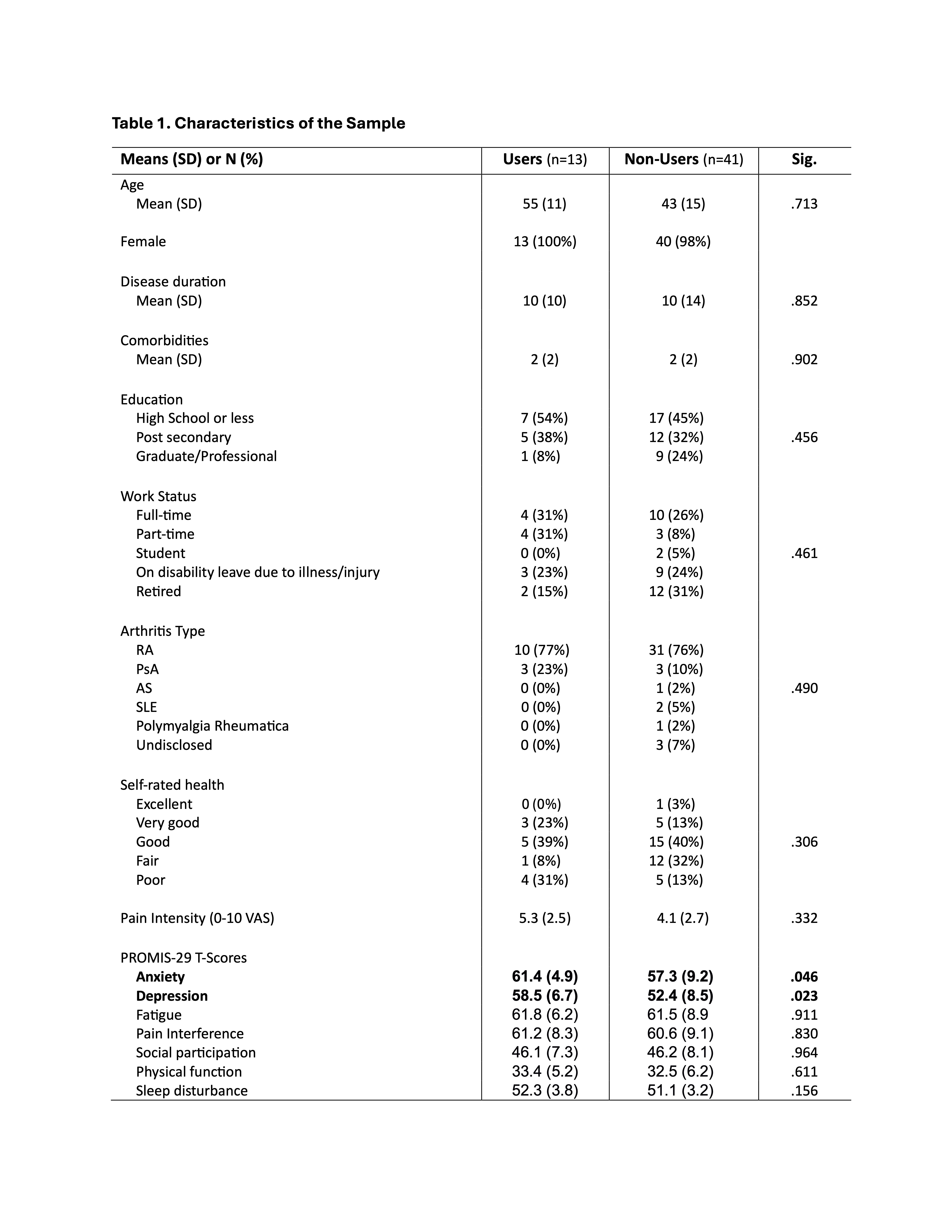Session Information
Date: Sunday, October 26, 2025
Title: (0357–0386) Patient Outcomes, Preferences, & Attitudes Poster I
Session Type: Poster Session A
Session Time: 10:30AM-12:30PM
Background/Purpose: The use of cannabis among individuals with rheumatologic conditions has gained increasing attention due to potential effects on pain, mood, and overall quality of life. However, data on its frequency of use, motivations, and patient-reported outcomes remain limited. We compared cannabis users and non-users by sociodemographic and arthritis characteristics and HRQL, and explored motivations for use, and assessed differences in HRQL among people with rheumatic diseases.
Methods: Data are from the baseline visit of a pilot study of people with inflammatory rheumatic diseases who volunteered for an internet-based intervention to improve sleep. Participants self-reported cannabis use, reasons for consumption, and completed the PROMIS-29 questionnaire (physical function, anxiety, depression, fatigue, sleep disturbance, pain interference, and social participation). Characteristics were compared between cannabis users and non-users using t-test and chi-square. Associations between cannabis use, demographics, and clinical characteristics were examined using multivariable regression.
Results: Our sample had a mean (SD) age of 54 (14) and 98% were female. Most had RA or PSA, with a mean disease duration of 10 (11) years; many also had OA (30%; Table 1). One third reported using cannabis use in the past year, and 24% in the past 3 months (of which 38% used weekly and 31% daily/almost daily). All participations indicated they were using for medicinal reasons only (100%), with primary motivations being to improve pain (19%), sleep (17%), fatigue (< 5%) or anxiety (< 5%). Nearly half (46%) reported a little improvement in arthritis symptoms with use, with 15% reporting a lot of improvement, 31% no change, and 8% were unsure. Compared to Non-Users, Users reported significantly higher anxiety (p=.046) and depression (p=.014). However, logistic regression results suggested cannabis use was not associated with differences in PROMIS-29 outcomes.
Conclusion: One in three participants in an online intervention to improve sleep reported using cannabis in the past year to improve their arthritis symptoms, with nearly a quarter using cannabis regularly to improve pain, sleep, fatigue and anxiety. User did not report different PROMIS-29 outcomes, although 61% reported a little to a lot of symptom improvement. Understanding the motivations and health impact of cannabis use can help guide patient counseling and future research on alternative management strategies for pain and mood disorders.
To cite this abstract in AMA style:
Andersen N, Lacaille D, Savard J, Rahme E, Fortin P, Da Costa D. An Internet-Delivered, Arthritis-Tailored Cognitive Behavioral Therapy for Insomnia Program for People with Co-Morbid Sleep Disturbance: Comparing Baseline Characteristics of Cannabis Users and Non-Users [abstract]. Arthritis Rheumatol. 2025; 77 (suppl 9). https://acrabstracts.org/abstract/an-internet-delivered-arthritis-tailored-cognitive-behavioral-therapy-for-insomnia-program-for-people-with-co-morbid-sleep-disturbance-comparing-baseline-characteristics-of-cannabis-users-and-non-us/. Accessed .« Back to ACR Convergence 2025
ACR Meeting Abstracts - https://acrabstracts.org/abstract/an-internet-delivered-arthritis-tailored-cognitive-behavioral-therapy-for-insomnia-program-for-people-with-co-morbid-sleep-disturbance-comparing-baseline-characteristics-of-cannabis-users-and-non-us/


.jpg)